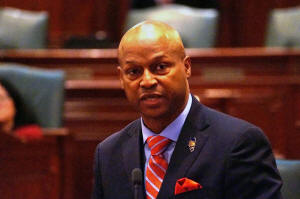Illinois locked in legal battles with Trump administration over
immigration policy
 Send a link to a friend
Send a link to a friend
 [February 07, 2025]
By Peter Hancock [February 07, 2025]
By Peter Hancock
SPRINGFIELD – Illinois participated in one court battle with the Trump
administration Thursday when a federal judge temporarily blocked
enforcement of an executive order that sought to end “birthright
citizenship” under the U.S. Constitution.
But the legal battles between the state and the White House over
immigration policy continued along other fronts this week as well. The
Justice Department filed a new suit against the state of Illinois, Cook
County and the city of Chicago over their respective “sanctuary”
jurisdiction laws that restrict local law enforcement agencies from
cooperating with federal immigration enforcement actions.
Meanwhile, Democrats in the Illinois House passed a series of
resolutions Wednesday – amid a walkout by the Republican caucus –
condemning the Trump administration for a series of actions taken in the
opening weeks of the new administration.
Among Trump’s actions were the executive order on birthright
citizenship, a short-lived freeze on distribution of federal aid and
grants, threats of tariffs against Canada, Mexico and China; and the
pardon of people convicted in the Jan. 6, 2021, assault on the U.S.
Capitol in Washington, D.C.
“What’s coming out of Washington, D.C. can be summed up in one word:
fascism,” House Speaker Emanuel “Chris” Welch, D-Hillside, said during a
speech on the House floor as he chastised Republicans for walking out.
“They should be here to speak out against fascism. We cannot be silent.”

Speaking at their own impromptu news conference outside the House
chamber, however, Republicans accused Democrats of ignoring more urgent
issues facing the people of Illinois.
“Illinois is broke and people are leaving,” Rep. Chris Miller, R-Hindsboro,
who attended the Jan. 6 protests in Washington, said during the news
conference. “It’s all because of bad public policy, and we aren’t
addressing the kitchen table issues that Illinois citizens are
interested in. We aren’t talking about safety and security, we aren’t
talking about quality education, we aren’t talking about economic
opportunity.”
The debates on the House floor Wednesday evening, and the legal
developments Thursday, illustrated the deep partisan chasm that exists
between the Democratic-controlled state government of Illinois and the
Republican administration of President Trump, particularly over the
issues of immigration and the rights of undocumented residents.
Birthright citizenship
During his first day back in office Jan. 20, Trump issued a flurry of
executive orders, including some meant to follow through on his campaign
promises to crack down on immigration, both legal and illegal, into the
United States.
Among those was one entitled “Protecting the Meaning and Value of
American Citizenship” that purported to deny citizenship to certain
people born in the United States to parents who were either not lawfully
present in the country or were lawful but temporary residents.
That order was immediately challenged in federal courts around the
country, including one filed in Seattle that Illinois Attorney General
Kwame Raoul joined on behalf of the state, along with the states of
Washington, Oregon and Arizona.
Plaintiffs in that case argued the order violated the plain text of the
14th Amendment – a post-Civil War amendment that, among other things,
extended constitutional civil rights to formerly enslaved individuals
under both federal and state law.
A key part of the amendment states, “All persons born or naturalized in
the United States, and subject to the jurisdiction thereof, are citizens
of the United States and of the State wherein they reside.”
On Jan. 23, U.S. District Judge John C. Coughenour issued a temporary,
14-day restraining order blocking enforcement of the order, giving the
court time to schedule a full hearing and review evidence.

[to top of second column]
|

House Speaker Emanuel “Chris” Welch speaks on the House floor
Wednesday as the chamber debated resolutions condemning recent
executive orders and actions by President Donald Trump’s
administration. (Capitol News Illinois photo by Peter Hancock)

That hearing was held Thursday and the court heard brief oral arguments
from Assistant Washington Attorney General Lane Polozola and Justice
Department attorney Drew Ensign.
Afterwards, Coughenour – a judge on senior status who was appointed to
the bench in 1981 by President Ronald Reagan – made it clear he did not
accept the White House’s argument, saying that for Trump, “the rule of
law is but an impediment to his policy goals.”
He then issued an order granting a nationwide temporary restraining
order, stating in the order, “Citizenship by birth is an unequivocal
Constitutional right.”
“I am pleased the court has granted our request for a nationwide
preliminary injunction and refused to let ‘the beacon of light’ that is
the rule of law darken,” Raoul said in a statement after the judge’s
ruling. “The 14th Amendment was enshrined in our nation’s Constitution
more than 150 years ago, and since then, the right of an individual born
in this country to be a citizen of this country has been uniformly
recognized.”
The order came one day after a federal judge in Maryland, ruling in a
separate case, likewise issued a nationwide restraining order.
Sanctuary status
Meanwhile, even as the birthright citizenship case was proceeding, the
Trump administration continued its offensive charge on immigration
policy. The administration filed its own lawsuit in federal court in
Chicago against the state, Cook County and the city of Chicago,
challenging what are often called “sanctuary” laws that the
administration argues are intended to shield undocumented immigrants
from federal law enforcement.
The suit challenges two state statutes: the 2017 TRUST Act, which
prevents state and local law enforcement officials from assisting the
federal government with civil immigration enforcement; and a 2021
amendment to that act, known as the Way Forward Act, which prohibits law
enforcement agencies from detaining individuals solely based on an
immigration detainer or civil immigration warrant.
It also challenges the city of Chicago’s Welcoming City Ordinance and a
Cook County ordinance, both of which, the suit alleges, inhibit the
ability of local law enforcement to provide assistance or information to
federal authorities engaged in immigration enforcement.

The suit argues all of those laws conflict with numerous federal
immigration laws, including the recently-enacted Laken Riley Act, which
mandates the federal detention of undocumented immigrants accused of
theft, burglary, assaulting a law enforcement officer and other violent
crimes.
The suit also cites the supremacy clause of the Constitution, found in
Article VI, which states that federal laws and treaties of the United
States are the “supreme Law of the Land,” regardless of any state laws
to the contrary.
“The United States has well-established, preeminent, and preemptive
authority to regulate immigration matters,” the suit states. “This
authority derives from the United States Constitution, numerous acts of
Congress, and binding U.S. Supreme Court precedent.”
But Gov. JB Pritzker said in a statement Thursday that he believes the
Trump administration’s lawsuit is without merit, adding, “We look
forward to seeing them in court.”
“Unlike Donald Trump, Illinois follows the law,” Pritzker said. “The
bipartisan Illinois TRUST Act, signed into law by as Republican
governor, has always been compliant with federal law and still is today.
Illinois will defend our laws that prioritize police resources for
fighting crime while enabling state law enforcement to assist with
arresting violent criminals.”
Capitol News Illinois is
a nonprofit, nonpartisan news service that distributes state government
coverage to hundreds of news outlets statewide. It is funded primarily
by the Illinois Press Foundation and the Robert R. McCormick Foundation. |